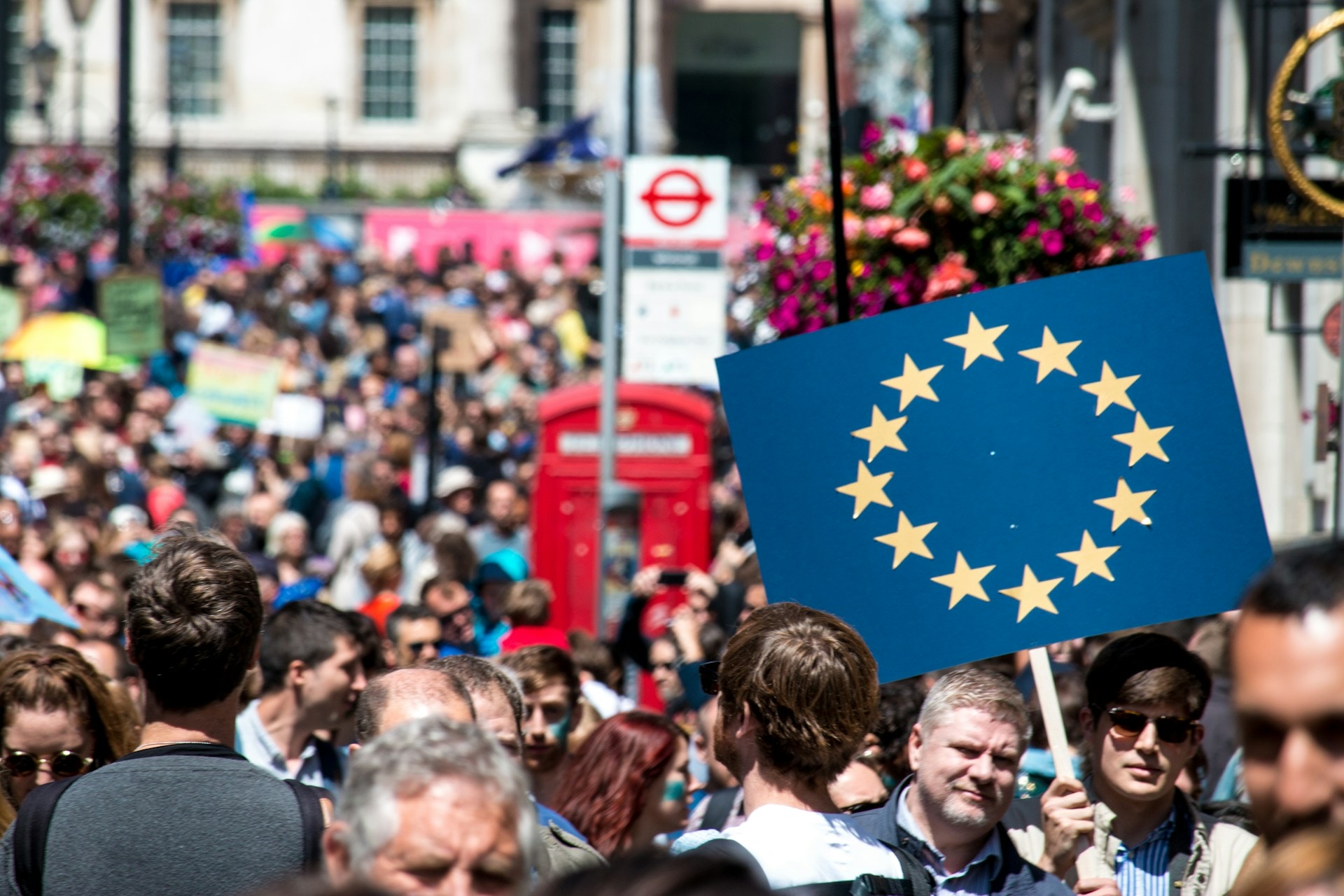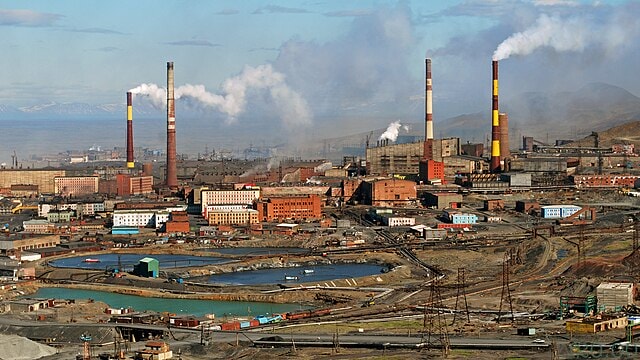On the Ground in the City of London
Winter is stealing over Britain, and many people are simply bunkering down, hoping to quietly ride out what will be a financially challenging season for many. I know many of my friends have agreements with families and partners not to worry about buying gifts this holiday season.
If you want public sector pay rises you need a vibrant economy.
A vibrant economy doesn't look like this at 7pm on a Wednesday, 10 days before Christmas pic.twitter.com/WO1XSg14gf
— Emma Revell (@emmamrevell) December 14, 2022
Others are choosing to light up the ever-darkening days of December by means of neon high vis vests and the symbolic spark of outrage.
As I walked to work on Thursday morning, the last leg of a commute that took twice as long as usual as a result of rail strikes, I waved at a picket line of nurses from the National Health Service (NHS) who had walked out due to a pay dispute.
NHS Nurses Go on Strike
This was the first day of the industrial action that NHS nurses have threatened for months, and it caused tens of thousands of outpatient appointments and non-urgent operations to be cancelled across England, Wales and Northern Ireland. Nurses from NHS Scotland came to an eleventh-hour agreement with the Scottish government on December 12 that allowed Scotland a reprieve from the same fate.
The NHS strikes in the rest of the UK are planned to escalate if the government will not offer pay rises acceptable to a union made up of employees who were lauded as public heroes just two years ago.
The mother of one of my colleagues is a midwife in the NHS. After finishing her shift on Thursday, my colleague brought the picketing nurses a few coffees and the pastries that were still sitting on display by the time we closed.
Although it is now a running joke at my place of work to remind each other to be “extra careful” whenever we go to use a ladder or a sharp knife, the general sentiment is one of support. The cafe in which we work is part of a hospitality business, a traditionally low-wage industry in the UK, so we all empathise with the lengths to which others are choosing to go in pursuit of a fairer wage.

An analysis based on OECD figures predicts that real wages in the UK are forecast to shrink by 6.2% (-£1,750) over the next two years – the tightest expected squeeze among G7 nations.
Industrial Action from the National Rail Services
Whilst we might make jokes about how inconvenient it would be if we were to require emergency services in the near future, as ambulance drivers are preparing to strike this week, the very real inconvenience of the rail strikes sweeping across the nation are affecting myself and my team first-hand.
Nonetheless, the severity of the disruption only reinforces the statement that strikers are trying to make – these jobs are essential to a functional economy and those who do them deserve to be paid accordingly.
In the latest spate of rail strikes, the National Union of Rail, Maritime and Transport Workers (RMT) held two 48-hour walkouts this week which disrupted train services across the UK.
Similar industrial action was called off in November less than 12 hours before the walkouts were planned, after RMT announced that they had entered into promising negotiations with the the Department for Transportation, Network Rail, and the other private rail companies that operate the train services themselves (such as LNER and Avanti).
However, no settlement ever came from these negotiations, so the series of strikes planned for last week went ahead. The continuation of this “Christmas rail strike” is planned to resume in early January, and RMT have made it clear that they too will go ahead.
Mick Lynch, the general secretary of RMT, said in no uncertain terms:
“If we call off the strikes, we’ll never get a settlement … My members won’t forgive me. I’ve given a commitment – until we get a tangible outcome, the action will be on.”
Members of my team generally live an hour away from the centre of London via public transportation. During strikes, I know that two of my employees typically spend upwards of four hours daily commuting to their eight hour shifts.
When a higher than average number of them “called out sick” last week during the strikes, I didn’t ask for details. It said enough that, in a time when most of the people with whom I work are living paycheck to paycheck, they felt the hassle of commuting wasn’t worth a whole day’s pay.
The Escalating Cost of Living Crisis
On the whole though, my place of work has been getting busier over the past few weeks. The cafe caters to a 10-floor corporate office building on the south bank of the Thames and a stone’s throw from Millennium Bridge; the patrons that frequent the cafe are professionals who work at the heart of London’s business world.
Every business in the building offers their employees the option to work from home three days out of five. However, one trend is becoming increasingly clear: as days get colder and energy prices stay high, my workplace gets busier. In a time of year when our revenue tends to decline as people begin to take annual leave over the holidays, the growing number of people who choose to spend their days in the office keeps our sales numbers steady.
The reason for this has become small talk, observations as trivial and commonplace as the weather – the fact that many of us can no longer afford to keep our homes warm means that more and more employees are coming into work to avail themselves of the free warmth.
My partner, who works in the Civil Service, a public employee within the fold of the UK government, has noticed the same trend at his workplace.
If middle class professionals and civil servants are openly struggling whilst in careers that used to symbolise the comfortable trappings of financial stability, can anyone blame those from traditionally low-wage industries for walking out and onto the picket lines?
London experienced a sharp temperature drop and unusual fall of snow last week that has allowed the cold reality of this winter to hit home sooner than expected. As a result, although industrial action across half a dozen sectors is disrupting many of the normal routines that typically accompany the holiday season, the British public remain, on the whole, empathetic with those who are on strike.

Walkouts in the Civil Service and Royal Mail
Strikes by the Royal Mail, which are expected to take place across seven dates in December, are also impacting a fundamental part of the holiday season – the sending and receiving of packages. Children the country over will remember this as the year with no Santa Clause, as delayed packages pile up outside warehouses that are usually as busy as the North Pole at this time of year.
Online shopping always increases over the holiday season, as does overall use of mail services for sending and receiving Christmas cards and presents. Let’s look on the bright side, perhaps this disruption will incentivise people to choose paperless Christmas cards and temper children’s expectations for future Christmases after the magic of childhood fades.
Related Articles: Industrial Action: A Threat to the Environment? | Life of a European Family After Brexit | Workers’ Unions Win in the US and UK: Upsurge or Blip? | Don’t Leave Says UK, “Tory Scum” Says Scotland
Beyond the transportation of packages over Christmas time, strikes are also disrupting the transportation of people. The Public and Commercial Services Union (PCS), which represents the UK’s Civil Servants, has announced strikes that will take place December 23-31 across seven of the island’s busiest airports and will heavily affect Border Force services.
The military is currently being trained to support the Border Force across this time period, but passengers have been told to expect much longer wait times when trying to enter the country.
Nonetheless, the Guardian published a report that many Brits went out into the cold to offer support in the form of hot, caffeinated beverages to those standing up for fairer wages. In the same breath, they include a calendar with symbols, colour-coded by industry, placed on every day of December that is experiencing industrial action from one sector or another. The calendar is as colourfully decorated as the Christmas trees that usually represent the mood of the season.
There is now a Twitter account dedicated solely to keeping the public up-to-date by means of a similarly dystopian Advent calendar:
🎅Celebrate the countdown to #Christmas in true #strikemapuk style🎄
🔽🖨️Download and print your Strikevent Calendar now>>https://t.co/kILu5eBI2w
*strikes accurate as of 02/12/22 pic.twitter.com/KsfHznqSYn
— Strike Map (@strike_map) December 2, 2022
But, is it really that bad?
These problems are relatively trivial in the grand scheme of things. People who have homes and jobs are still able to find warmth. Some families might have a slightly less gift-oriented holiday, and the nation, since the COVID-19 pandemic, has grown somewhat accustomed to travel disruptions that make it challenging to physically visit loved ones during the holidays.
But, this image of hardship is a veneer covering a much darker crevasse over which the nation is currently suspended.
The other day, one of my team members approached me to ask, rather hesitantly, if I knew anyone who had a free couch for the night. I wondered if she had a friend coming to stay or had had a fight with her boyfriend, but nonetheless I didn’t have one and said so. My partner and I live in a small family’s second room.
She explained that one of the restaurant’s servers had confessed to her that he was homeless and had been for a while, living out of the small backpack that he brought to and from work. He’d been prompted to ask for help after snow had blanketed the city the previous evening.
The person in question had never stood out to me for any reason besides being clean-cut, punctual, polite, and hard-working, albeit quiet; I was floored. I told her that I wouldn’t mind if he slept in the back room until he found somewhere, but one of the other team members piped up with a couch to offer.
The same team who opened his home had come to me that morning to ask for more hours on the next week’s rota, because he couldn’t get by any longer on the number of hours he was currently working.
I, in turn, had to to explain that I had already overspent the cafe’s labour budget with that exact issue in mind, attempting to ensure that each of my team members, who are paid hourly, would be offered enough work to get by.
Right now, many remain insulated from the worst effects of the economic downturn, still cutting costs within a margin of comfort. As mid-level management in a medium-sized business, I take the bus instead of the tube sometimes now and have recently cancelled my gym membership. My partner and I have stopped ordering a weekly takeaway and wear heavy jumpers at home – easy sacrifices really compared to some.
Can we really blame all of this on Brexit?
The people en masse continue to cast blame for the crisis onto the UK’s departure from the EU, which came into effect on Jan. 31, 2020.
Whether or not Brexit is the root cause of these economic hardships is a question that will be discussed by historians and economists for decades. Whether it is exacerbating them is undoubted:
The factors that influence the economy are multiple and multi-faceted, but the foundation of the discontent generating these strikes lies in the fact that inflation is high and wages aren’t rising to meet the ever-increasing cost of living.
The different unions mentioned above are struggling to negotiate the settlements that would allow strikes to be called off because the pay rises being offered can’t match the rate of inflation. NHS nurses in England, Wales, and Northern Ireland expect to be offered a 2% pay rise in 2023. In October, the CPI (consumer price inflation) 12-month rate in the UK reached 11.1%.
The average pay rise offered to NHS Scotland nurses, which was accepted by unions, was only 7.5%.
Workers striking for better wages are so desperate that they are willing to accept what is, in real terms, a pay cut.
So, if these strikes are a result of inflation, is Brexit responsible for the rising costs of goods and services in the UK?
One good whose sky-rocketing price is driving up the cost of living is, obviously, the fuel that it takes to heat our homes and buildings, and keep the lights on.
The price of oil has been affected by a variety of influences over the past two years, but it is generally agreed that there are two that have had the most influence: increased demand as post-covid society begins to move again and Putin’s war in the Ukraine, which is especially relevant within European markets. In addition, OPEC chose to cut oil production in October, which is reducing supply further.
Nonetheless, many of the public have pinned the soaring price of utilities on the fact that the UK has left the EU’s Internal Energy Market. In reality, there is little evidence to back this claim.
There is one factor affecting the cost of fuel within the UK that is likely a result of Brexit; the net value of the pound sterling has depreciated since early 2020, which means that any goods bought from an international market will be more expensive if they are paid for in pounds.
However, the rising cost of other goods and services is probably due, in part, to losing the EU as a convenient trading partner. Analysis from the London School of Economics suggests that imports into the UK from the EU have dropped by 25%. In the meantime, the UK has not developed enough trade relations with other nations to supply sufficient quantities to fill this vacuum
Now, the UK’s trade deficit is steadily growing, which itself dampens any potential for the economic growth that Brexit, in theory, was meant to stimulate. Basically, slowing imports means a decreasing supply; since demand is remaining steady, the cost of imported goods is going up.
The physical proximity of Europe had always made it the UK’s most sensible partner in trade. Now, high gas and fuel prices mean that countries further afield, who might offer their goods at lower wholesale prices than Europe, will not be able to undercut what the UK was paying previously to the EU, simply due to the cost of transport.
The other factor affecting the cost of goods and services is labour. When citizens previously could move freely between the EU and the UK, the EU offered a steady stream of labour into the UK. Now, EU citizens need to obtain visas to work in the UK, visas that come with a minimum wage threshold meant specifically to prevent people coming to work in the UK for low-wage jobs.
The British labour pool has not yet filled the gap in many low-wage industries, causing labour shortage in sectors across the nation, which has resulted in wage-driven inflation. The Tory part have argued this is a necessary step on the way to a high-wage economy, another original goal of Brexit, but the benefits of a high-wage economy are yet to be seen, as inflation continues to outstrip real wages.
The paradox here is that the inflation rate in the UK actually hovers at nearly the same rate as the EU’s. The CPI (consumer price inflation) 12-month rate of the two economies have have been leapfrogging each other for the top spot over the past few months. In October 2022, inflation in the EU stood at 10.6%, only slightly lower than 11.1% in the UK. The previous month, inflation in the EU was 10.9%, outstripping the UK, which stood at 10.1%.
There is an argument that the rate of inflation in the UK, which jumped a whole percentage point from September to October, seems to be significantly outstripping that of the EU, which increased 0.3% in the same time period. However, people on the picket lines aren’t demonstrating anger over fractions of a percentage point.
So, why are people in the UK finding it so much harder to cope with the same economic pressures that are affecting all of Europe?
The reason boils down to the approach, or lack thereof, taken by the British government to the crisis compared to other governments within the EU. Italy is offering a robust subsidy program to financially help people modernise their homes to make them more fuel efficient. France began investing in nuclear energy as a replacement for fossil fuel years ago; that foresight has since come to fruition as the country now generates 75% of its energy from this alternative power source.
In the rest of Europe, governments across the board have dedicated billions to financially shielding consumers from the rising cost of living.
Meanwhile in the UK, Liz Truss was passing a mini budget that served no other purpose than to wreak havoc on the UK’s economy. The pound to fall to its lowest-ever level to the US dollar. To counteract the damage, the Bank of England raised interest rates, which caused mortgages to go up, and now more than 5 million families could see their average annual mortgage payments rise by £5,100 between now and the end of 2024.
It is still unclear if Rishi Sunak will be willing or able to halt the economic freefall that he inherited.
For now, instead of pinning the UK’s hardships this winter on a single poor decision from five years ago, we should be pointing the finger at the real culprit: the continued wilful incompetence of the political party that made Brexit happen in the first place.
Editor’s Note: The opinions expressed here by the authors are their own, not those of Impakter.com — In the Featured Photo: A sign depicting ex-Prime Minister Boris Johnson as the Joker. Featured Photo Credit: Jannes Van den Wouwer.














